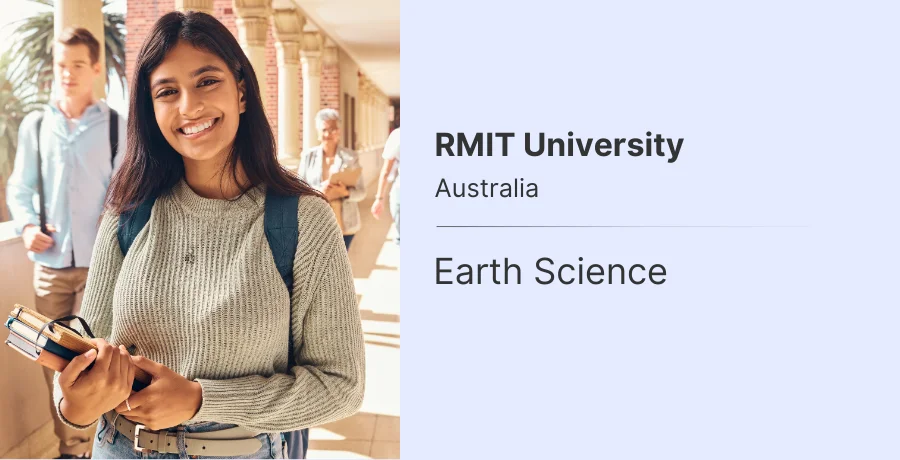Earth Science at University of Southern Australia (UniSA) Australia
Table of Contents
- Highlights
- Why Study Earth Science at University of Southern Australia (UniSA) Australia?
- University of Southern Australia (UniSA) Earth Science Rankings
- University of Southern Australia (UniSA) Earth Science Acceptance Rate
- Popular Earth Science Courses at University of Southern Australia (UniSA) Australia
- Admission Requirements to Earth Science at University of Southern Australia (UniSA) Australia
- Cost of Earth Science at University of Southern Australia (UniSA) Australia for Indian Students
- Scholarships at University of Southern Australia (UniSA) Australia
- Job Prospects for Earth Science at Australia
- FAQs – Earth Science at University of Southern Australia (UniSA) Australia
Earth Science at University of Southern Australia (UniSA) Australia – Highlights
The Earth Science course at the University of Southern Australia (UniSA) offers a comprehensive understanding of the geological and environmental processes that shape our planet. Located in the vibrant city of Adelaide, students enjoy a rich cultural and academic environment. UniSA's state-of-the-art facilities and experienced faculty provide an excellent foundation for aspiring Earth scientists.
This course is designed to equip students with the skills and knowledge needed to tackle real-world environmental challenges. From field trips to laboratory work, the Earth Science program at UniSA ensures a hands-on learning experience. Students also benefit from the university's strong industry connections, which enhance their employability upon graduation.
Why Study Earth Science at University of Southern Australia (UniSA) Australia?
Studying Earth Science at UniSA offers numerous advantages, including access to world-class facilities and a curriculum that is both comprehensive and industry-relevant. The university's location in Adelaide provides a unique opportunity to study diverse geological formations and ecosystems. Additionally, UniSA's commitment to research and innovation ensures that students are at the forefront of scientific discovery.
- Strong industry connections for enhanced employability
- Hands-on learning through field trips and laboratory work
- Experienced faculty with a focus on research and innovation
- Located in the vibrant city of Adelaide
University of Southern Australia (UniSA) Earth Science Rankings
| Ranking System | Rank |
|---|---|
| US News and World Report Ranking | Top 150 |
| QS Ranking | Top 200 |
| THE Ranking | Top 250 |
| ARWU Ranking | Top 300 |
University of Southern Australia (UniSA) Earth Science Acceptance Rate
- The acceptance rate for the Earth Science program at UniSA is competitive, reflecting the program's high standards.
- Students are selected based on their academic performance, entrance exam scores, and relevant experience.
Popular Earth Science Courses at University of Southern Australia (UniSA) Australia
- Bachelor of Science (Earth Science): This undergraduate program provides a solid foundation in geology, meteorology, and environmental science. Students gain practical skills through field trips and laboratory work.
- Bachelor of Environmental Science: Focuses on understanding and managing the natural environment. It covers topics like ecology, conservation, and environmental management.
- Master of Environmental Science: An advanced program that delves into environmental policy, sustainable practices, and advanced research techniques.
- Master of Geospatial Science: This program trains students in the use of GIS and remote sensing technologies for environmental analysis.
Admission Requirements to Earth Science at University of Southern Australia (UniSA) Australia
Admission to the Earth Science program at UniSA involves meeting specific academic and language proficiency requirements. Prospective students must demonstrate a strong background in relevant subjects and possess the necessary skills for advanced study.
Entry Requirements:
-
- Completion of high school with a strong academic record in science subjects
- Passing the UniSA Earth Science entrance exam
Eligibility Criteria:
Students must have completed their secondary education with a focus on science subjects. They should also demonstrate proficiency in English through standardized tests such as IELTS or TOEFL.
International students are required to meet additional criteria, including obtaining a student visa and providing proof of financial stability. UniSA offers support services to assist with the application and visa process.
Documents Required
- Academic transcripts: Certified copies of previous academic records.
- Proof of English proficiency: IELTS or TOEFL scores.
- Personal statement: A written statement outlining academic goals and motivations.
- Letters of recommendation: From teachers or professionals in the field.
Proficiency Test
Applicants must demonstrate English proficiency through standardized tests such as IELTS or TOEFL. The minimum required scores are usually specified by the university and may vary based on the program.
Visa Process
- Apply for a student visa through the Australian Department of Home Affairs.
- Provide evidence of enrollment in the Earth Science program at UniSA.
- Submit proof of financial capacity to cover tuition fees and living expenses.
- Undergo a health examination as part of the visa application process.
Cost of Earth Science at University of Southern Australia (UniSA) Australia for Indian Students
Tuition Fees: The tuition fees for the Earth Science program at UniSA vary depending on the level of study. On average, undergraduate programs cost around AUD 30,000 per year, while postgraduate programs can cost up to AUD 35,000 per year.
Cost of Living: The cost of living in Adelaide is relatively affordable compared to other Australian cities. Students should budget approximately AUD 20,000 per year for accommodation, food, transportation, and other expenses.
| Expense | Cost (AUD/year) |
|---|---|
| Tuition Fees | 30,000 - 35,000 |
| Living Expenses | 20,000 |
Scholarships at University of Southern Australia (UniSA) Australia
UniSA offers a variety of scholarships to support international students in their academic journey. These scholarships are awarded based on academic merit, financial need, and other criteria.
- International Student Scholarship: This scholarship provides partial tuition fee waivers for high-achieving international students.
- Vice Chancellor's International Excellence Scholarship: Awarded to students with exceptional academic records and leadership potential. It covers a significant portion of the tuition fees.
Job Prospects for Earth Science at Australia
Graduates of the Earth Science program at UniSA have excellent job prospects in various sectors. The demand for skilled Earth scientists is high, particularly in industries such as mining, environmental consulting, and government agencies.
| Job Title | Average Salary (AUD/year) |
|---|---|
| Geologist | 80,000 - 100,000 |
| Environmental Consultant | 70,000 - 90,000 |
| Hydrogeologist | 75,000 - 95,000 |
| GIS Specialist | 65,000 - 85,000 |
FAQs – Earth Science at University of Southern Australia (UniSA) Australia
- Can I work while studying Earth Science at UniSA?
Yes, international students in Australia are allowed to work part-time during their studies. This helps them gain practical experience and support their living expenses.
- What are the advantages of studying Earth Science at UniSA?
Studying at UniSA offers access to world-class facilities, experienced faculty, and strong industry connections. The hands-on learning experience prepares students for successful careers in Earth Science.
- What is the average salary for Earth Science graduates?
The average salary for Earth Science graduates varies based on the job role and industry. Generally, it ranges from AUD 65,000 to 100,000 per year.
- What is the duration of the Earth Science program?
The duration of the Earth Science program at UniSA is typically three to four years for undergraduate degrees and one to two years for postgraduate degrees.
- What exams are required for admission to the Earth Science program?
Admission to the Earth Science program at UniSA may require passing the UniSA entrance exam and demonstrating English proficiency through tests like IELTS or TOEFL.
- What are some popular Earth Science courses at UniSA?
Popular courses include the Bachelor of Science (Earth Science), Bachelor of Environmental Science, Master of Environmental Science, and Master of Geospatial Science.












